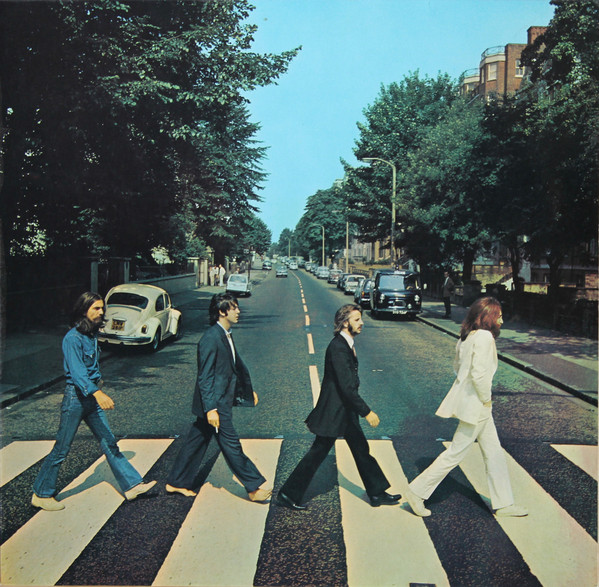 Abbey Road is more or less The Beatles‘ final album1, and it contains some of the group’s strongest work – especially George Harrison, who finally gets his day in the sun.
Abbey Road is more or less The Beatles‘ final album1, and it contains some of the group’s strongest work – especially George Harrison, who finally gets his day in the sun.
I’m not sure when I got my first copy of Abbey Road. Might have been high school, or it might have been the first release of The Beatles’ catalog on CD. This was back in the dark, pre-Internet, ages when knowing exactly what the “official” Beatles releases were was non-trivial.
The vast majority of Abbey Road was in heavy rotation on the local classic rock stations all through my formative years, of course, but it’s best appreciated in its entirety.
“Come Together” is a bit moody, and even though it’s John Lennon’s baby the bit I enjoy most out of this is Paul McCartney’s bass playing alongside the electric piano work by Lennon.
Harrison’s “Something” is a beautiful song. Some of his best guitar work here, too, but the song itself is amazing. It’s been widely covered, by everybody from Joe Cocker to Frank Sinatra to Liberace. Not surprisingly, I prefer the original to any of the covers I’ve heard. “Something” is one of those songs that I’ll circle the block rather than shut off the radio if it’s playing.
Bang Bang Maxwell…
I’ve always considered it an odd choice to follow up “Something” with McCartney’s friendly little homicidal ditty, “Maxwell’s Silver Hammer.” Don’t get me wrong, I really love this song as well, but it’s an abrupt tonal and mood shift from “Something.” I think of pairing “Maxwell’s” with Warren Zevon’s “Excitable Boy.”
It is an instantly catchy song, with a fairly simple tune and it’s easy to sing the chorus without really thinking about the meaning.
“Oh! Darling,” feels like McCartney trying to channel Little Richard a bit. (At least the “woo-woo’s” and more impassioned vocals.) I like this song, but it’s probably the weakest on Abbey Road.
Abbey Road aquatic adventures
What is it with Ringo and underwater adventures, anyway? First it was “Yellow Submarines,” and now an “Octapus’s Garden.” It’s a damned fun, cheery song, though. Harrison’s solo on this is damned nice, and the rest of the band appropriately joyful on the backing vocals.
After the escapist joy of “Octapus’s Garden,” we go straight into the heavy stuff. While “I Want You (She’s So Heavy)” may not be metal, it’s pretty damn heavy for 1969/1970. Lennon breaks out the primal scream here before the descent into doom. At nearly eight minutes long, it’s a fairly protracted blues jam with minimal lyrics. While not the first band to use one, The Beatles are well ahead of their time with the Moog-generated white noise that gets increasingly louder towards the end of the track. And then silence.
George Harrison’s day in the sun
After all that, if you were listening on an album, you’d get “Here Comes the Sun” as the first track on side two. Again, Harrison is shining brightly. Great fills by Ringo, sweet acoustic work by Harrison, and overall just a frigging incredible work. If you aren’t smiling a little bit after listening to this one, seek professional help.
Abbey Road‘s “medley” (“You Never Give Me Your Money” through “The End”) is an amazing experience. The medley is why I prefer Abbey Road to Sgt. Pepper, because this just feels like the band is leaving everything out on the court. It’s a pity that the band never played this live, because in a just universe they’d have played stadium shows and ended the set with the Abbey Road medley. Nice to see Starr finally getting a drum solo he can sink his teeth into on a Beatles album.
The Beatles were never better
I often wonder what The Beatles might have come up with if they’d stayed together, but it’s hard to complain about what we got. In about seven years, the Fab Four released 12 original (UK) albums, more than 300 songs total and more than 230 original songs. Almost all of their work (I’m excluding “Revolution 9” as unlistenable noise, and “You Know My Name (Look Up the Number)” as just dumb) is fantastic. But Abbey Road, at least in my opinion, is their finest work. It’s well ahead of its time, and still sounds fresh nearly 50 years later.
[1] Let It Be was released after Abbey Road, but the bulk of it was recorded before Abbey Road. It was held back and finished after Abbey Road had already been released, when The Beatles were basically finished.
